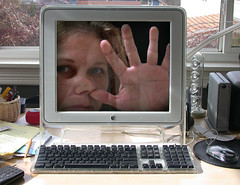
For reasons I can’t entirely explain, the first thing I thought of while reading David Parry’s Ubiquitous Surveillance was an old reality show on MTV called Room Raiders, of which I may or may not have seen a few dozen episodes. For the sake of my point, let’s pretend I have. The premise of the show is that some single boy or girl decides which of three prospective people he or she would like to take on a date. The catch is that they do not get to see (or even speak) to the mystery contestants, but must make a decision solely by examining the contents of their bedrooms.
Can you imagine the things a stranger could learn about us from examining the space we live in? And while at first glance it may seem like an invasion of privacy, one has to ask how much we already invite strangers into our personal lives. More and more, the internet is becoming a place where we live. It is where we work, shop, communicate, share, and look for entertainment. If someone wanted to know something about us, where do you think they would look––the room where we sleep, or the electronic box in which we live?

Upon a little research into that old show (which I haven’t admitted to watching), I discovered something interesting. After a while, they re-launched the series to include not only raids of contestants’ physical possessions, but of the content of all their electronics, as well. MTV describes it this way:
“With lives being more and more tech-savvy, contestants will be checking out the computer history, cell phones, music preferences, digital cameras and text messages of total strangers. They’ll decide who to date based on the contents of not just bedrooms, but their most private possessions.”
When inviting a new friend over for the first time, one may think to clean up their room first. But, that isn’t really an option when it comes to the web. As Omer Tene puts it in What Google Knows: Privacy and Internet Search Engines, “Every day, millions of users provide Google with unfettered access to their interests, needs, desires, fears, pleasures, and intentions. Many users do not realize that this information is logged and maintained in a form which can facilitate their identification.” Beyond just our search history, the photos, videos, blogs, calendars, articles, etc. that we read and share each day say something about who we are. One doesn’t need to access our credit cards or social security numbers to learn something about us.
In the last few weeks, I’ve come to see how much the internet is a part of me––a part of us. The internet is becoming more and more individualized. It is transforming into something more tangible, like a person to whom we ask our questions and share our secrets (whether we realize it or not.) Our most personal information is out there somewhere, and the question we should be asking is, “Who’s watching?”
P.S. Apparently Room Raiders is still being aired. It was launched in 2004 and is on its 8th season. But, you didn’t hear that from me.